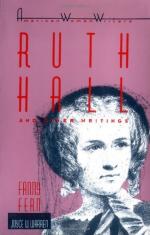|
This section contains 5,086 words (approx. 17 pages at 300 words per page) |

|
SOURCE: “Text and Context in Fanny Fern's Ruth Hall: From Widowhood to Independence,” in Joinings and Disjoinings: The Significance of Marital Status in Literature, edited by JoAnna Stephens Mink and Janet Doubler Ward, Bowling Green State University Popular Press, 1991, pp. 67-76.
In the following essay, Warren explores how Fern's own experience as a vulnerable and powerless widow served as the basis for her novel Ruth Hall and caused her to urge all women—married and unmarried—to secure economic independence for themselves.
When Fanny Fern's novel Ruth Hall was published in 1855, it created a sensation. In this largely autobiographical novel, Sara Willis Parton (1811-1872), writing under the pseudonym of Fanny Fern, satirized her male relatives (her father, her father-in-law, her brother, and her brother-in-law), who had provided neither compassion nor adequate financial assistance when she was left a widow. Although her novel was published under her pseudonym, one...
|
This section contains 5,086 words (approx. 17 pages at 300 words per page) |

|


